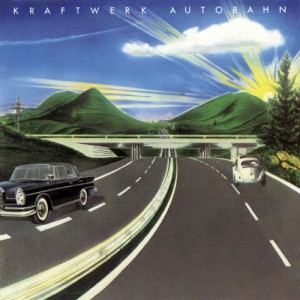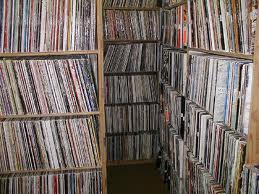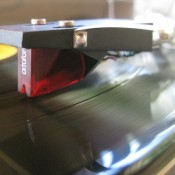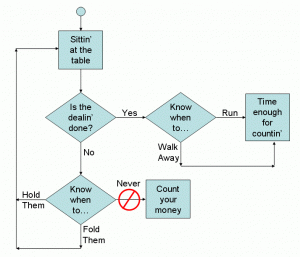Soon after their very early Can-like Krautrock years, Kraftwerk began to develop and refine a hardcore man-machine aesthetic, imagining themselves as cyborg musicians, as much enslaved by technology as liberated by it. The amazing thing is that the band-machine has been able to sustain itself on that track. Almost any other group would have gone on to other things after the vein ran cold, but Kraftwerk continue to tap the mineshaft of digitalized culture as deep as it wants to go.
As a boy in the late 70s, I used to sit on the shag-carpet floor of my basement bedroom and gaze into the cover of Kraftwerk’s Autobahn, a pair of giant Koss headphones connected to a glowing analog amp by a long green spiral cord, mesmerized by the pulsing, organic, yet also completely artificial sound of this strange German synth group. I imagined myself driving the beige VW bug, watching the black Mercedes zoom past in the opposite direction, as oscillators, generators and patch bays synthesized the sights and sounds of life in a place  called “Germany,” where everyone could drive as fast as they damn well pleased and the album covers went on forever.


 For anyone over 40 (or maybe 30), having a music collection probably means that, in addition to racks of CDs and ridiculous piles of MP3s, you’re also sitting on bookshelves (or “borrowed†milk crates) full of vinyl LPs. Hundreds of pounds of space-consuming, damage-prone vinyl. LPs were music you could touch, with glorious full-color 12″ album art, meandering liner notes, and the practical involvement of lowering needle to plastic. Long-playing records represent an era when music was less disposable – we actually sat down to listen, rather than treating music as a backdrop to the rest of life. Dragging a rock through vinyl was not some kind of nostalgic love affair with the past – it was just the way things were. The cost of admission was pops and scratches, warped discs, having to get up in the middle of an album to flip the disc, cleaning the grooves from time to time, and getting hernias every time you moved to a new apartment.
For anyone over 40 (or maybe 30), having a music collection probably means that, in addition to racks of CDs and ridiculous piles of MP3s, you’re also sitting on bookshelves (or “borrowed†milk crates) full of vinyl LPs. Hundreds of pounds of space-consuming, damage-prone vinyl. LPs were music you could touch, with glorious full-color 12″ album art, meandering liner notes, and the practical involvement of lowering needle to plastic. Long-playing records represent an era when music was less disposable – we actually sat down to listen, rather than treating music as a backdrop to the rest of life. Dragging a rock through vinyl was not some kind of nostalgic love affair with the past – it was just the way things were. The cost of admission was pops and scratches, warped discs, having to get up in the middle of an album to flip the disc, cleaning the grooves from time to time, and getting hernias every time you moved to a new apartment. Digitizing LPs has almost nothing in common with ripping CDs. It’s a slow process, and a lot of work. But it can be incredibly rewarding, and going through the process puts you back in touch with music the way it used to be played (i.e. it’s a great nostalgia trip). Over at birdhouse.org,
Digitizing LPs has almost nothing in common with ripping CDs. It’s a slow process, and a lot of work. But it can be incredibly rewarding, and going through the process puts you back in touch with music the way it used to be played (i.e. it’s a great nostalgia trip). Over at birdhouse.org,  The panelists debated “algorithms and blues,” wondering aloud whether technology has freed listeners from music journalists — or made them more valuable than ever. The discussion had a bit of trouble focusing on the topic at hand – many seemed more interested in the completely worn-out question of the impact of blogging on journalism. Fair enough – there are a hell of a lot of excellent music blogs out there, and there’s no question they soak up a lot of eyeballs/traffic that formerly went to Rolling Stone and Spin. But at the same time, very few of the music blogs have the expertise, or go into the depth that RS and Spin do. Still, it’s a pretty tired question by now.
The panelists debated “algorithms and blues,” wondering aloud whether technology has freed listeners from music journalists — or made them more valuable than ever. The discussion had a bit of trouble focusing on the topic at hand – many seemed more interested in the completely worn-out question of the impact of blogging on journalism. Fair enough – there are a hell of a lot of excellent music blogs out there, and there’s no question they soak up a lot of eyeballs/traffic that formerly went to Rolling Stone and Spin. But at the same time, very few of the music blogs have the expertise, or go into the depth that RS and Spin do. Still, it’s a pretty tired question by now.
